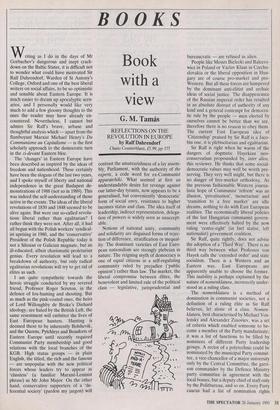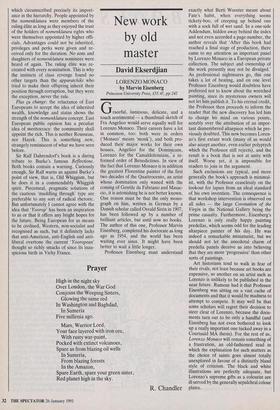BOOKS
Writing as 1 do in the days of Mr Gorbachev's dangerous and inept crack- down on the Baltic States, it is difficult not to wonder what could have motivated Sir Ralf Dahrendorf, Warden of St Antony's College, Oxford and one of the best liberal writers on social affairs, to be so optimistic and sensible about Eastern Europe. It is much easier to dream up apocalyptic scen- arios, and I personally would like very much to add a few gloomy thoughts to the ones the reader may have already en- countered. Nevertheless, I cannot but admire Sir Ralf's brave, urbane and thoughtful analysis which — apart from the flamboyant Marxist Michael Henry's Du Communisme au Capitalisme — is the first scholarly approach to the democratic turn in the ci-devant Eastern bloc.
The 'changes' in Eastern Europe have been described as inspired by the ideas of freedom and nationhood. These certainly have been the slogans of the last two years, and I spoke myself of liberty and national independence in the great Budapest de- monstrations of 1988 (not so in 1989). This was indeed the self-understanding of those active in the events. The ideas of the liberal revolutions of 1830 and 1848 seemed to be alive again. But were our so-called revolu- tions liberal rather than egalitarian? I rather think they were not. After all, it had all begun with the Polish workers' syndical- ist uprising in 1980, and the `conservative' President of the Polish Republic today is not a Silesian or Galician magnate, but an ill-educated, albeit charismatic proletarian genius. Every revolution will .lead to a breakdown of authority, but only radical egalitarian revolutions will try to get rid of elites as such.
I am quite sympathetic towards the heroic struggle conducted by my revered friend, Professor Roger Scruton, in the defence of fox-hunting and shooting. But as much as the pink-coated ones, the heirs of Lord Willoughby de Broke's Diehard ideology, are hated by the British Left, the same resentment will embitter the lives of East European hunters. Hunting is deemed there to be inherently Bolshevik, and the Quorns, Pytchleys and Beauforts of Eastern Europe until recently required Communist Party membership and good relations with the local branches of the KGB. High status groups — in plain English, the titled, the rich and the famous — are unpopular with the new political forces whose leaders try to appear as `classless' (a familiar Marxist-Leninist phrase) as Mr John Major. On the other hand, conservative supporters of a 'de- ferential society' (pardon my jargon) will
Book with a view
G. M. Tamas
REFLECTIONS ON THE REVOLUTION IN EUROPE by Ralf Dahrendorf
Chatto Counterblasts, £5.99, pp.155
contrast the amateurishness of a lay assem- bly, Parliament, with the authority of the experts, a code word for ex-Communist apparatchiki. What seemed at first an understandable desire for revenge against our latter-day tyrants, now appears to be a generalised, but conveniently 'democratic' form of social envy, resistance to higher incomes status and class. The idea itself of leadership, indirect representation, delega- tion of powers is widely seen as unaccept- able.
Notions of national unity, community and solidarity are disguised forms of rejec- tion of difference, stratification or inequal- ity. The dominant varieties of East Euro- pean nationalism are strongly plebeian in nature. The reigning myth of democracy is one of equal citizens in a self-regulating community ruled by prejudice (`public opinion') rather than law. The market, the liberal compromise between elites, the benevolent and limited rule of the political class — legislative, jurisprudential and bureaucratic — are refused as alien.
People like Messrs Bielecki and Balcero- wicz in Poland or Vaclav Klaus in Czecho- slovakia or the liberal opposition in Hun- gary are of course pro-market and pro- Western. But all these forces are hampered by the dominant anti-elitist and archaic ideas of social justice. The disappearance of the Russian imperial order has resulted in an absolute distrust of authority of any kind and a general contempt for democra- tic rule by the people — men elected by ourselves cannot be better than we are, therefore there is no reason to obey them. The current East European idea of `Citizenship' praised by Sir Ralf is a Jaco- bin one, it is plebiscitarian and egalitarian.
Sir Ralf is right when he warns of the dangers of dogmatic Hayekian neo- conservatism propounded by, inter alios, this reviewer. He thinks that some social- democratic values may well be worth pre- serving. They very well might, but there is no danger of free-market orthodoxy. As the previous fashionable Western journa- listic hope of Communist 'reform' was an illusion, 'privatisation', `monetarism' and `transition to a free market' are idle dreams, nothing to do with East European realities. The economically liberal policies of the last Hungarian communist govern- ment were effectively halted by the now ruling 'centre-right' (in fact statist, left nationalist) government coalition.
Sir Ralf, quite rightly, does not advise the adoption of a 'Third Way'. There is no third way between what Professor von Hayek calls the 'extended order' and state socialism. There is a Western and an Eastern way. East Europeans are apparently unable to choose the former. This inability is perhaps explained by the nature of nomenklatura, incorrectly under- stood as a ruling class.
The nomenklatura is a method of domination in communist societies, not a definition of a ruling elite as Sir Ralf believes, let alone of a class. Nomen- klatura, best characterised by Michael Vos- lensky and Alexander Zinoviev, was a set of criteria which enabled someone to be- come a member of the Party mandarinate; it was a list of functions to be filled by nominees of different Party leadership groups. A rector of a polytechnic could be nominated by the municipal Party commit- tee, a vice-chancellor of a major university only by the Central Committee, the garri- son commander by the Defence Ministry party committee in agreement with the local bosses, but a deputy chief of staff only by the Politbureau, and so on. Every Party caucus had a list of nomination rights which circumscribed precisely its import- ance in the hierarchy. People appointed by the nomenklatura were members of the ruling elite as long as they enjoyed the trust of the holders of nomenklatura rights who were themselves appointed by higher offi- cials. Advantages could not be inherited, privileges and perks were given and re- ceived only for the duration. No sons and daughters of nomenklatura nominees were heard of again. The ruling elite was re- created with every nomination. This is why the instincts of class revenge found no other targets than the apparatchiki who tried to make their offspring inherit their position through corruption, but they were the exception, never the rule.
Plus ca change: the reluctance of East Europeans to accept the idea of inherited wealth, knowledge and status shows the strength of the nomenklatura concept. East European public opinion has a peculiar idea of meritocracy: the community shall appoint the rich. This is neither Rousseau, nor Hayek. This is something new, strangely reminiscent of what we have seen before.
Sir Ralf Dahrendorf's book is a daring tribute to Burke's famous Reflections. Both books contain a warning. Curiously enough, Sir Ralf warns us against Burke's point of view, that is, Old Whiggism, but he does it in a commendably Whiggish spirit. Piecemeal, pragmatic solutions of the cautious `muddling through' type are preferable to any sort of radical rhetoric. But unfortunately I cannot agree with the idea that `Yoorop' has been an inspiration to us or that it offers any bright hopes for the future. Being European for us means to be civilised, Western, non-socialist and recognised as such, but it definitely lacks that anti-American, anti-English and anti- liberal overtone the current `Yooropean' thought so richly smacks of since its inau- spicious birth in Vichy France.



























































 Previous page
Previous page